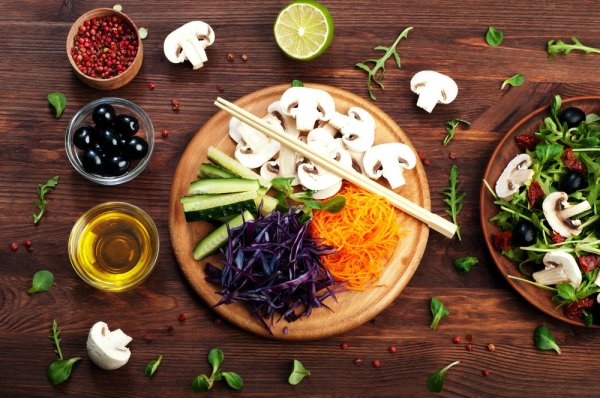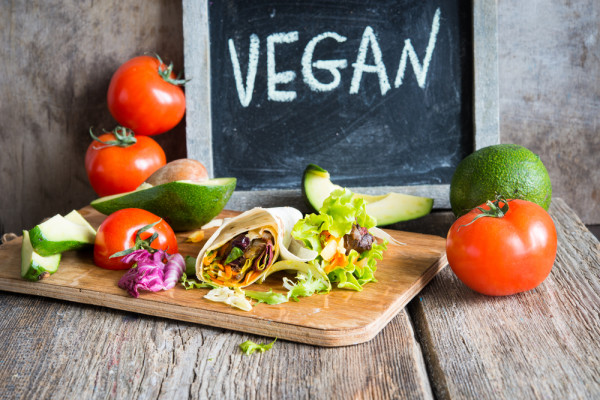Vegan vs. Vegetarian Diets (and Everything In Between): Which is Right for You?

Been loving Meatless Monday and thinking about taking things a bit further? You’re in luck. We’ve taken a look at lots of different plant-based diets, comparing vegan vs. vegetarian lifestyles (and everything in between) to help you make the best choice for you and your family.
Vegetarian Diets
According to a 2015 Harris Poll, about 2.8 percent of Americans are vegetarian and .51 percent of Americans are vegan, though other polls report up to 16 million vegetarians (5 percent of Americans) in the U.S. alone. And the numbers are only increasing with no sign of slowing down any time soon.
A vegetarian diet is one of the most popular and mainstream plant-based diets. Simply put, vegetarians do not eat meat, fish, or poultry. Dipesh Mehta, one lifelong vegetarian, defines it straightforwardly as, “nothing with a face.”
Excluding all forms of meat means that special attention must be paid to getting certain key vitamins and minerals, including protein and iron. Luckily, there are assorted sources of plant proteins to choose from when opting for this diet, and generally speaking, planning meals and trying new foods affords vegetarians a balanced and nutritious diet with very little necessary supplementing.

Vegetarian concept image via Shutterstock
But the vegetarian diet can actually further broken down into several subsets. Here, we define them by the most flexible first, with the most restrictive last.
Flexitarian
A flexitarian, also sometimes known as a semi-vegetarian, is someone who eats a primarily vegetarian diet but splurges on occasional meat-based meals. A 2013 article in The Guardian noted that in many cases, flexitarianism was a gateway to a different or more restrictive type of vegetarianism — in other words, flexitarians were dipping their toe into the vegetarian pool before deciding whether or not to jump in. The Guardian also noted that in most cases, meat consumed by flexitarians tended to be humanely and organically raised.
Author and dietician Dawn Jackson Blatner literally wrote the book on the flexitarian diet; in her 2010 “The Flexitarian Diet,” she defines a “beginner flexitarian” as having two meatless days per week, and an “advanced flexitarian” as skipping meat up to 5 days per week.
Flexitarians Do Eat
- Dairy, eggs, fruits and vegetables, oils, beans, pulses, nuts, seeds
- Meat, poultry, fish and seafood (in moderation)
Flexitarians Don’t Eat
Flexitarians limit but do not completely restrict their consumption of meat, poultry, fish, and seafood.
Pollotarian
A pollotarian will consume poultry, fish, and seafood, but no beef, pork, lamb, or any other mammal meat.
The health benefits of choosing pollotarianism include reduced risk of both heart disease and high cholesterol. While it is an excellent choice from a health standpoint, the ethical and environmental concerns of poultry farming are nearly as worrying as those of meat farming, so this change, while a step in the direction of a meat-free lifestyle, it is not generally considered by other vegetarians to be a truly vegetarian diet, as this Live Strong article explains.
Pollotarians Do Eat
Poultry, fish and seafood, dairy, eggs, fruits and vegetables, oils, beans, pulses, nuts, seeds
Pollotarians Don’t Eat
Meat
Pescetarian
Pescetarians, also sometimes known as pesco-vegetarians, eat fish and seafood while foregoing all other meats. The balance between the consumption of omega-3- and protein-rich seafood and fish and the lack of meat makes this diet an easy one to consume healthfully.
The only thing to be wary of with pescetarianism is where your fish is coming from. Be sure to keep up to date on which seafoods are healthful and sustainable before doing your weekly shop for groceries, should you opt for this diet.
Pescetarians Do Eat
Fish and seafood, dairy, eggs, fruits and vegetables, oils, beans, pulses, nuts, seeds
Pescetarians Don’t Eat
Meat and poultry
Lacto-Ovo Vegetarian
A lacto-ovo vegetarian follows the sort of diet most people think of when they think of a vegetarian diet; in other words, a lacto-ovo vegetarian will consume eggs and dairy but no animal flesh, including all red meats, poultry, fish, and seafood.

Mediterranean meal image via Shutterstock
Many lacto-ovo vegetarians also pay special attention to the quality of their eggs and dairy. Mehta says that after speaking with a vegan friend, he began thinking more about how these ingredients are produced. “It does creep into my head now, when I buy milk, cheese, and butter,” he admits, though he’s still not ready to make the leap to vegan.
“The bare bones is that the world just isn’t set up to cater to vegans yet,” the London resident says. “Sure, there’s more vegan cafes and pop-ups appearing in trendy locations than before, but being vegan today means a major change in lifestyle rather than just a change in diet. It used to be a similar story for vegetarians, and still is in some countries, but the world has become more accommodating and being vegetarian isn’t uncommon or seen as strange anymore.”
In the meantime, Mehta sticks to a strict vegetarian diet and does his best to ensure any eggs or dairy products he buys are produced as humanely as possible.
Lacto-Ovo Vegetarians Do Eat
Dairy, eggs, fruits and vegetables, oils, beans, pulses, nuts, seeds
Lacto-Ovo Vegetarians Don’t Eat
Meat, poultry, fish, and seafood
Ovo-Vegetarian or Veggan
Ovo-vegetarianism is a subset of vegetarianism that begins to approach veganism. Ovo-vegetarians do not consume dairy products, but they do consume eggs. Generally, the exclusion of dairy from the diet is either done for health reasons or for or ethical reasons linked to the industrial practices behind the production of milk and dairy products.
Ovo-Vegetarians Do Eat
Eggs, fruits and vegetables, oils, beans, pulses, nuts, seeds
Ovo Vegetarians Don’t Eat
Meat, poultry, fish, seafood, and dairy
Lacto-Vegetarian
Lacto-vegetarians, unlike ovo-vegetarians, do consume dairy products but do not consume eggs. This practice is common for religious reasons but less common for ethics or health. Some vegetarians do opt for this version of the diet because of the added calcium, phosphorous, vitamin D, and vitamin B12 in dairy products, making supplements taken by vegans largely unnecessary.
Ovo Vegetarians Do Eat
Dairy, fruits and vegetables, oils, beans, pulses, nuts, seeds
Ovo Vegetarians Don’t Eat
Meat, poultry, fish, seafood, and eggs
Famous Vegetarians
If you opt for vegetarianism, you’re not alone. Some of the many famous vegetarians include:
- Mark Twain
- Danny DeVito
- Allen Ginsberg
- Dustin Hoffman
- Ian McKellen
- Anna Paquin
- Paul McCartney
- Leonardo Da Vinci
- William Wordsworth
- Avril Lavigne
- Forest Whitaker
Vegan Diet
Although veganism could be seen as the next logical step after cutting out eggs and dairy, it’s actually distinctly different from being vegetarian. The reasoning is that veganism is not just a diet – it’s a lifestyle.

Vegan image via Shutterstock
As Cat Distasio, who has been vegan for the past 36 years, explains, “Veganism is markedly distinct from vegetarianism in that it’s the total and complete avoidance of animal products, both in diet and lifestyle. Although veganism is often viewed as a subset of vegetarianism, I think it’s a bit more helpful to think of them as two points on a spectrum, with variations on vegetarianism (ovo, lacto, flex, etc.) being closer to omnivore.”
So what does a vegan lifestyle entail exactly? Aside from dietary choices, vegans will not buy leather, wool, silk, or any cosmetics that have been tested on animals. They also will not purchase or use tallow or glycerine soaps, animal glues, or any cosmetics that contain animal-derived products.
That said, not all vegans have to adhere to both the diet and the lifestyle, explains Distasio. “That’s part of the reason the phrase ‘plant-based diet’ has gained so much popularity in recent years, as people who are adopting such a diet for health reasons need terminology to use that differentiates them from people who have chosen to be vegan (in diet and lifestyle completely) for ethical reasons.”
As far as diet is concerned, vegans do not eat any products derived from animals. This includes meat, dairy, eggs, gelatin, and even honey.
With such a long list of things not to eat, it might seem that a vegan diet would be difficult to follow healthfully. But other than making sure you have a balance of different plant proteins and sources of iron, Distasio says that the major supplement to be aware of is vitamin B12, which isn’t available in any plant-based foods, as well as vitamin D, particularly in the winter. She also recommends vegan registered dietician Ginny Messina’s resource on supplements for vegans.
Vegans Do Eat
Fruits and vegetables, oils, beans, pulses, nuts, seeds
Vegans Don’t Eat
Meat, poultry, fish and seafood, dairy, eggs, gelatin, honey
Paleo Vegan
Some choose to even further restrict their diet for health reasons, adhering to diets like the paleo vegan diet. This involves modifying the existing paleo diet, which is generally fairly meat- and dairy-heavy. The modifications aren’t easy, as paleo diets call for a whopping 25 percent protein and exclude pulses and seed-like grains.
Blogger No Meat Athlete offers three solutions: you can include eggs in your diet (paying special attention to their source), allow a pass for hemp and grain-like seeds like quinoa, or opt for soaked or sprouted beans and legumes. Each of these options has its own pros and cons, so research the option that works best for you.
Paleo Vegans Do Eat
Fruits and vegetables, oils, nuts, seeds
Paleo Vegans Don’t Eat
Meat, poultry, fish and seafood, dairy, eggs, gelatin, honey, grains, grain-like seeds, beans, pulses, starchy tubers, alcohol, sugars
Raw Vegan
The raw vegan diet is fairly self explanatory: a raw vegan eats everything a vegan does, but in raw form. This means that all beans, pulses, and nuts are soaked before being consumed.
Many raw vegans are flexi-raw vegans, meaning that somewhere between 60 and 80 percent of their diet is raw, with the other 20 to 40 percent being a regular vegan diet.
Raw Vegans Do Eat
Raw and fermented fruits and vegetables, raw oils, soaked raw nuts, soaked raw beans and pulses
Raw Vegans Don’t Eat
Meat, poultry, fish and seafood, dairy, eggs, gelatin, honey, grain-like seeds, alcohol
Famous Vegans
If you opt for a vegan diet, you’re in good company. Here are just a few famous vegans:
- Moby
- Casey Affleck
- Alan Cumming
- Olivia Wilde
- Alec Baldwin
- Morrissey
- Kristen Bell
- Alanis Morissette
- Alicia Silverstone
- Mayim Bialik
- Carrie Underwood
- Ellen Page
It may seem as though there are endless options for a more plant-based lifestyle, but regardless of which diet you choose, any way of eating that reduces red meat consumption is better for you and for the environment. Methane produced by cows in American is more detrimental to the climate than car pollution, according to some studies, and diets rich in red meat have additional health risks, such as high cholesterol and heart problems.
That’s why, no matter which diet you choose, cutting back on meat is a great way to begin. There’s no need to do it all at once — take a page out of the book of the flexitarian, and begin by having a few meatless meals every week, and slowly transition to entire meatless days. Bonus: it’ll save you quite a bit of money. Meat and dairy are some of the most expensive products at the store, leaving you more than enough to splurge on your favorite organic produce.
Did we miss any of your favorite plant-based diets? Let us know on Facebook or via Twitter @organicauthorit.
Related on Organic Authority
What Are the 4 Most Important Supplements for a Vegan Diet?
Finally, A Vegan Medical Center Focuses on Nutrition, Not Drugs
Veganic Farming: Can it Save the Vegan Diet from Animal-Based Soil?
Healthy fruits and vegetables image via Shutterstock

